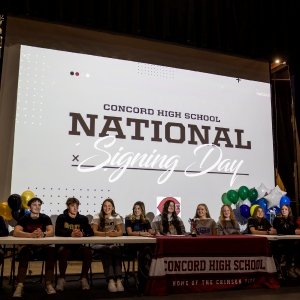Citizen’s group threatens Concord School Board autonomy over middle school decision
| Published: 04-03-2024 4:27 PM |
A group of activists upset about the Concord School Board’s decision not to rebuild a potential new middle school at the current site have issued an ultimatum: reverse the vote or risk losing your autonomy.
At Monday’s board meeting, Charlie Russell of the Concord Concerned Citizens group announced that it would begin work on as many as three charter amendment petitions: one would require the district’s annual budget to get approval from voters, another would put any school capital projects over $50 million on the ballot, and a third would strip the board of its unique autonomy.
“You can listen now and be responsive and rescind the December vote, or you can endure the consequences,” Russell said.
When the board made that vote in December, two former longtime board members took to the microphone and issued a warning.
“This form of governance is fragile, and very much predicated on trust of our elected officials,” said Kass Ardinger, who led the board through the elementary schools construction project. If the board voted contrary to what Ardinger saw as “a huge community groundswell of consensus” behind rebuilding the middle school in the south end, she feared it would break that foundation of trust and fuel new efforts to dismantle the independence that makes Concord the “envy of other school districts around the state.”
Betty Hoadley, who served for more than a decade on the board, was more blunt.
“The privilege of autonomy in this district is at risk,” Hoadley said. “Too many people worked too long and too hard to keep it.”
As anger over the board’s 6-3 vote to move a new school to the Heights has continued to simmer, Russell made clear Concord Concerned Citizens are taking the first steps towards actualizing Ardinger and Hoadley’s warnings.
Article continues after...
Yesterday's Most Read Articles
 Casella Waste Systems’ landfill project in New Hampshire’s North Country denied permit
Casella Waste Systems’ landfill project in New Hampshire’s North Country denied permit
 ‘Less finger pointing, more communication’: Longtime Chichester residents share hopes before second town meeting
‘Less finger pointing, more communication’: Longtime Chichester residents share hopes before second town meeting
 ‘The revenue just isn’t there’: House Finance Committee slashes $271M in jobs, services from Ayotte’s budget proposal
‘The revenue just isn’t there’: House Finance Committee slashes $271M in jobs, services from Ayotte’s budget proposal
 12 Concord student-athletes sign on to play at the collegiate level
12 Concord student-athletes sign on to play at the collegiate level
 ‘There was no oversight’: NH child advocate has been a watchdog for children's care. Now, the office is on the chopping block
‘There was no oversight’: NH child advocate has been a watchdog for children's care. Now, the office is on the chopping block
 Volunteer group wants to help homeless clean up their camp
Volunteer group wants to help homeless clean up their camp
Unlike other cities in the state, Concord’s board is separate from city government — the budget does not need the approval of the city council and mayor. Critics of autonomy have long argued that it gives the board too much financial freedom and, without a second round of budget scrutiny, insulates it from responsiveness to voters. Proponents emphasize that autonomy gives the board agility and security: it has more flexibility to amend its budget and accrue savings, and does not have to manage the volatility of major cuts by city leaders or residents — like those in Manchester and Pembroke this year.
“The flexibility we have has allowed us to keep our tax increases under the rate of inflation… It allows us to continue to attract and maintain world-class teachers,” Board President Pamela Walsh said in an interview. “If we’re suddenly in the business and voting up and down budget, and then we’re voting up or down teacher contracts, that can make us an unattractive place to work.”
The charter can be amended multiple ways, but a voter-led amendment has to be drafted by a committee, have its language legally reviewed by the state, and get signatures from 15% of the number of voters from the last election to be placed on a ballot, per RSA 49-B. Ballot amendments have to win more than 60% of the vote to pass, the charter states.
Russell said work to draft petition language is beginning as soon as possible. Aiming to place amendments on the ballot his November, he’s targeted finalized language by the end of this month.
The Concerned Citizens group formed in February among people who had continued to attend board meetings and speak against the Broken Ground vote. They created a petition, now with over 1,000 signatures, to try and convince the board to reconsider.
The group hung the hopes of their demand on two new board members who took office in January and three continuing ones who favored Rundlett. If those members sided in unison with the Concerned Citizens group, they could outnumber the continuing board members who chose to relocate. But more than one board member, new and returning, who preferred Rundlett has said they felt revisiting the vote would set an irresponsible precedent for district governance.
Feeling like their concerns have been heard but not taken seriously, said Bob Macini, the online petition’s author, the group feels like it has “no choice” but to pursue a charter petition.
“If we’re going to get our elected representatives to pay attention to what the public is asking them to do,” he said, “we have to revise the charter so that we have some voice.”
“I and along with other board members have made the best decision I could based on the facts,” Walsh said. “That is what I believe I was elected to do: not only to listen but also to use my judgment.” Voters are empowered to disagree with that judgment at the ballot box, Walsh continued, but she objected to the idea that “board members should do what they don’t think is the right thing because of a threat.”
Walsh also noted that, with designs in process, going back on the location vote would be expensive.
“People of goodwill can disagree about the location of the middle school,” Walsh said. “We shouldn’t do something that will harm our community or our schools in the long run because we disagreed about one decision.”









 Henniker ponders what is a ‘need’ and what is a ‘want’
Henniker ponders what is a ‘need’ and what is a ‘want’ Boscawen residents vote to fund major renovation of public works building
Boscawen residents vote to fund major renovation of public works building ‘Voting our wallets’: Loudon residents vote overwhelmingly against $1.7M bond for new fire truck
‘Voting our wallets’: Loudon residents vote overwhelmingly against $1.7M bond for new fire truck In Pembroke, Education Freedom Accounts draw debate, voters pass budget
In Pembroke, Education Freedom Accounts draw debate, voters pass budget
